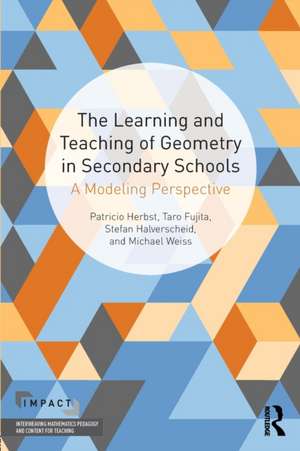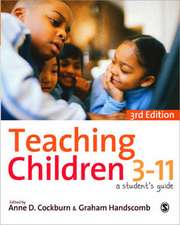The Learning and Teaching of Geometry in Secondary Schools: A Modeling Perspective: IMPACT: Interweaving Mathematics Pedagogy and Content for Teaching
Autor Pat Herbst, Taro Fujita, Stefan Halverscheid, Michael Weissen Limba Engleză Paperback – 20 mar 2017
The Learning and Teaching of Geometry in Secondary Schools reviews past and present research on the teaching and learning of geometry in secondary schools and proposes an approach for design research on secondary geometry instruction.
Areas covered include:
- teaching and learning secondary geometry through history;
- the representations of geometric figures;
- students’ cognition in geometry;
- teacher knowledge, practice and, beliefs;
- teaching strategies, instructional improvement, and classroom interventions;
- research designs and problems for secondary geometry.
| Toate formatele și edițiile | Preț | Express |
|---|---|---|
| Paperback (1) | 386.73 lei 43-57 zile | |
| Taylor & Francis – 20 mar 2017 | 386.73 lei 43-57 zile | |
| Hardback (1) | 767.20 lei 43-57 zile | |
| Taylor & Francis – 22 mar 2017 | 767.20 lei 43-57 zile |
Preț: 386.73 lei
Nou
Puncte Express: 580
Preț estimativ în valută:
73.100€ • 77.47$ • 61.23£
73.100€ • 77.47$ • 61.23£
Carte tipărită la comandă
Livrare economică 07-21 aprilie
Preluare comenzi: 021 569.72.76
Specificații
ISBN-13: 9780415856911
ISBN-10: 0415856914
Pagini: 250
Ilustrații: 32
Dimensiuni: 156 x 234 x 21 mm
Greutate: 0.39 kg
Ediția:1
Editura: Taylor & Francis
Colecția Routledge
Seria IMPACT: Interweaving Mathematics Pedagogy and Content for Teaching
Locul publicării:Oxford, United Kingdom
ISBN-10: 0415856914
Pagini: 250
Ilustrații: 32
Dimensiuni: 156 x 234 x 21 mm
Greutate: 0.39 kg
Ediția:1
Editura: Taylor & Francis
Colecția Routledge
Seria IMPACT: Interweaving Mathematics Pedagogy and Content for Teaching
Locul publicării:Oxford, United Kingdom
Public țintă
Postgraduate and UndergraduateCuprins
IMPACT—Series Foreword
Acknowledgments
Introduction
Chapter 1: The Discourse of Teaching and Learning Secondary Geometry through History
1.1. Introduction
1.2. Overview of This Chapter
1.3. The Development of Geometry up to the So-Called Foundational Crisis
1.4. The Shaping of Geometry Curricula in the Nineteenth and Twentieth Centuries
1.5. Recent Developments
1.6. Conclusion
Chapter 2: Geometric Figures and Their Representations
2.1. Introduction
2.2. Conceptions of Figure: What Ee Mean by Conception
2.3. Initial Conceptions of Geometric Figures
2.4. The Geometric Diagram in the Literature
2.5. A Modeling Perspective in the Study of Figures
2.6. Conclusion
Chapter 3: Students’ Thinking and Learning in Geometry
3.1. Introduction
3.2. Conceptions of Figure and Students’ Cognition
3.3. Geometric Figures and Students’ Learning as Progressive Change in Cognition
3.4. Enriching Semiotic Registers, Operations, and Control Structures with DGS
3.5. Theoretical Underpinnings for Learning Trajectories of Geometric Figures
3.6. Conclusion
Chapter 4: Teaching Practice and Teacher Knowledge in Geometry Instruction
4.1. Introduction
4.2. Teaching Practice in Geometry
4.3. Teacher Knowledge of Geometry
4.4. Studies of Preservice Teachers’ Knowledge of Geometry
4.5. Another Look at Elementary and Middle Grades Teachers
4.6. Beliefs of Secondary Geometry Teachers
4.7. Conclusion
Chapter 5: Improving the Teaching and Learning of Geometry in Secondary School Classrooms
5.1. Introduction
5.2. Communication Tasks: A Contribution of the Theory of Didactical Situations to the Design of Interventions
5.3. Secondary Geometry in the Service of Modeling the Experience with Shape and Space
5.4. Communication Tasks in the Teaching and Learning of Geometry
5.5. Concluding this Chapter
Chapter 6: A Conclusion and a Beginning: Doing Research on The Teaching and Learning of Secondary Geometry
6.1. Introduction
6.2. Research questions
6.3. Conclusion
References
Acknowledgments
Introduction
Chapter 1: The Discourse of Teaching and Learning Secondary Geometry through History
1.1. Introduction
1.2. Overview of This Chapter
1.3. The Development of Geometry up to the So-Called Foundational Crisis
1.4. The Shaping of Geometry Curricula in the Nineteenth and Twentieth Centuries
1.5. Recent Developments
1.6. Conclusion
Chapter 2: Geometric Figures and Their Representations
2.1. Introduction
2.2. Conceptions of Figure: What Ee Mean by Conception
2.3. Initial Conceptions of Geometric Figures
2.4. The Geometric Diagram in the Literature
2.5. A Modeling Perspective in the Study of Figures
2.6. Conclusion
Chapter 3: Students’ Thinking and Learning in Geometry
3.1. Introduction
3.2. Conceptions of Figure and Students’ Cognition
3.3. Geometric Figures and Students’ Learning as Progressive Change in Cognition
3.4. Enriching Semiotic Registers, Operations, and Control Structures with DGS
3.5. Theoretical Underpinnings for Learning Trajectories of Geometric Figures
3.6. Conclusion
Chapter 4: Teaching Practice and Teacher Knowledge in Geometry Instruction
4.1. Introduction
4.2. Teaching Practice in Geometry
4.3. Teacher Knowledge of Geometry
4.4. Studies of Preservice Teachers’ Knowledge of Geometry
4.5. Another Look at Elementary and Middle Grades Teachers
4.6. Beliefs of Secondary Geometry Teachers
4.7. Conclusion
Chapter 5: Improving the Teaching and Learning of Geometry in Secondary School Classrooms
5.1. Introduction
5.2. Communication Tasks: A Contribution of the Theory of Didactical Situations to the Design of Interventions
5.3. Secondary Geometry in the Service of Modeling the Experience with Shape and Space
5.4. Communication Tasks in the Teaching and Learning of Geometry
5.5. Concluding this Chapter
Chapter 6: A Conclusion and a Beginning: Doing Research on The Teaching and Learning of Secondary Geometry
6.1. Introduction
6.2. Research questions
6.3. Conclusion
References
Notă biografică
Pat Herbst is Professor of Education and Mathematics at the University of Michigan, USA. Pat is a former high school mathematics teacher in Argentina and his research focuses on the nature of the mathematical work that students do in secondary classrooms and the work that teachers do to manage knowledge development.
Taro Fujita is a lecturer in mathematics education at the University of Exeter, UK. Originally a mathematics teacher in Japan, Taro currently teaches the learning and teaching of mathematics in primary schools and higher mathematics, and he is also editorial assistant for the International Journal for Technology in Mathematics Education.
Stefan Halverscheid is Professor of Mathematics Education at the University of Göttingen, Germany. His background is in complex and differential geometry in the presence of symmetries and in research on the teaching and learning of mathematics. He has experience as a high school teacher, has lectured in Teacher Education at Münster, Oldenburg and Bremen Universities, and was Dean of Studies and Dean of the Faculty of Mathematics and Computer Science at Göttingen.
Michael Weiss is currently on the faculty of the Department of Mathematics at the University of Michigan, USA. His background is in mathematics education and pure mathematics, and he was formerly a high school mathematics teacher in the United States.
Taro Fujita is a lecturer in mathematics education at the University of Exeter, UK. Originally a mathematics teacher in Japan, Taro currently teaches the learning and teaching of mathematics in primary schools and higher mathematics, and he is also editorial assistant for the International Journal for Technology in Mathematics Education.
Stefan Halverscheid is Professor of Mathematics Education at the University of Göttingen, Germany. His background is in complex and differential geometry in the presence of symmetries and in research on the teaching and learning of mathematics. He has experience as a high school teacher, has lectured in Teacher Education at Münster, Oldenburg and Bremen Universities, and was Dean of Studies and Dean of the Faculty of Mathematics and Computer Science at Göttingen.
Michael Weiss is currently on the faculty of the Department of Mathematics at the University of Michigan, USA. His background is in mathematics education and pure mathematics, and he was formerly a high school mathematics teacher in the United States.
Descriere
The Teaching and Learning of Geometry provides an initial consideration of these questions and a primer for teachers and young scholars to get involved in addressing them. Geometry has long been a mainstay of the secondary school curriculum internationally, charged with the responsibility of introducing students to the practices of theoretical mathematics. This book provides a pedagogical framework for the teaching and learning of geometry grounded in theory and research. It can support teacher preparation and professional development, and orient classroom research by teachers and development efforts directed to teachers.











